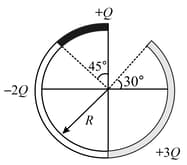Embibe Experts Solutions for Chapter: Electrostatic Potential and Capacitance, Exercise 1: Exercise
Embibe Experts Physics Solutions for Exercise - Embibe Experts Solutions for Chapter: Electrostatic Potential and Capacitance, Exercise 1: Exercise
Attempt the free practice questions on Chapter 17: Electrostatic Potential and Capacitance, Exercise 1: Exercise with hints and solutions to strengthen your understanding. Achieve Indian Airforce Agniveer Vayu Physics Practice Book solutions are prepared by Experienced Embibe Experts.
Questions from Embibe Experts Solutions for Chapter: Electrostatic Potential and Capacitance, Exercise 1: Exercise with Hints & Solutions
A uniform electric field exists in a region and is given by . There are four points , , and in the plane. Which of the following is the correct relation for the electric potential?
The electric potential at a distance of on the axis of a short dipole of dipole moment is
The electric potential in volts due to an electric dipole of dipole moment coulomb-metre at a distance of on a line making an angle of with the axis of the dipole is
Which of the following is not true?
Figure shows three circular arcs, each of radius and total charge as indicated. The net electric potential at the centre of curvature is:

A pure capacitor in an AC circuit,
If the plates of a parallel plate capacitor are not equal in area, then
The plates of a parallel plate condenser are being moved away with a constant speed . If the plate separation at any instant of time is , then the rate of change of capacitance with time is proportional to,
